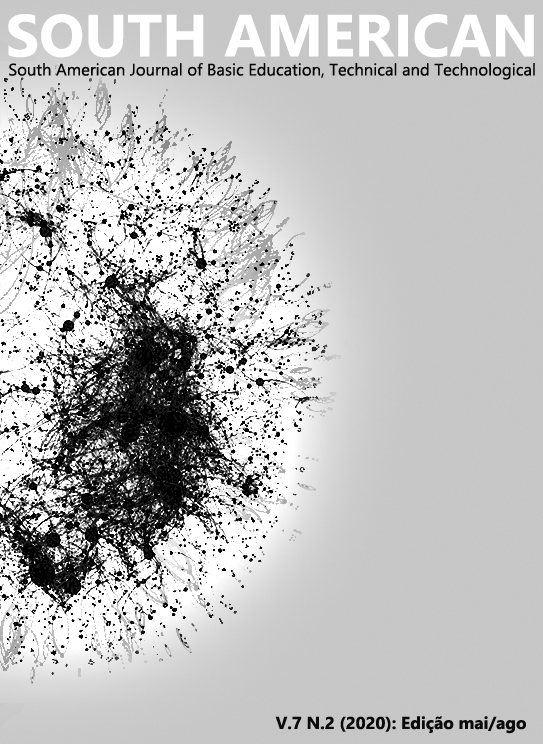O ESTADO DO CONHECIMENTO DE PESQUISAS SOBRE FORMAÇÃO DE PROFESSORES COM ENFOQUE CTSA NO BRASIL
Palavras-chave:
Formação docente. CTSA. InterdisciplinaridadeResumo
O presente trabalho consiste em um “estado do conhecimento” de pesquisas envolvendo a formação inicial e continuada de professores com enfoque CTSA no Brasil. Temos como objetivo geral verificar quais e quantas produções do Catálogo de Teses e Dissertações da CAPES se relacionam com a temática em foco. Foram usados três descritores para a busca na base de dados. O primeiro descritor não apresentou resultados; o segundo e o terceiro apresentaram os mesmos resultados, filtrando exatamente os mesmos 183 trabalhos. Desses 183, selecionamos os 143 posteriores a plataforma Sucupira que disponibilizavam resumos e palavras-chaves. A partir da leitura dos 143 resumos, identificamos o total de 20 teses e dissertações que tratam da abordagem CTSA na formação inicial e continuada de professores. Entre os 20 trabalhos, destacamos 3 pesquisas (1 dissertação, 2 teses) que, em uma perspectiva interdisciplinar da abordagem CTSA, envolvem diferentes cursos de licenciaturas. Percebemos que o interesse pela temática é um tanto recente e, apesar do avanço significativo e crescente aumento de pesquisas em relação as produções de teses e dissertações no período de 2007 a 2018, a temática formação de professores com enfoque CTSA ainda representa um número baixo nas produções. Novas pesquisas na área contribuiriam significativamente para o avanço das discussões relacionadas à interdisciplinaridade e abordagem CTSA na formação de professores.
Downloads
Referências
[2] MORIN, Edgar. Os sete saberes necessários à educação do futuro. 2. ed. – São Paulo: Cortez; Brasília, DF: UNESCO, 2000.
[3] CHRISPINO, Álvaro. Introdução aos enfoques CTS – ciência, tecnologia e sociedade - na educação e no ensino. 1. Ed. Madrid – Espanha: OEI –Organização dos estados Iberoamericanos, 2017.
[4] SILVA, P. B. C. DA. Ciência, Tecnologia e Sociedade na América Latina nas décadas de 60 e 70: Análise de obras do período. Dissertação (Mestrado em Ciência, Tecnologia e Educação) Centro Federal de Educação Tecnológica Celso Suckow da Fonseca, 2015.
[5] AULER, Décio; DELIZOICOV, Demétrio. Educação CTS: articulação entre pressuposto do educador Paulo Freire e referenciais ligados ao movimento CTS. Revista Las Relaciones CTS em la Educación Científica, 2006.
[6] CHALMERS, Alan F. O que é ciência afinal? Tradução: Raul Filker. Editora Brasiliense, 1993
[7] NUNES, Albino Oliveira. DANTAS, Josivânia Marisa. As relações ciência–tecnologia–sociedade-ambiente (CTSA) e as atitudes dos licenciandos em química. Educ. quím, 23(1), 85-90, 2012.
[8] GONÇALVES, Daniela Antunes. Et al. Compreensões sobre interações Ciência, Tecnologia, Sociedade (CTS) de educadoras dos Anos Iniciais: em busca de elementos para construir um processo formativo, Anais da XI ENPEC, Florianópolis-SC, 2017.
[9] SOUZA, Graziela Ferreira de. Os desafios da alfabetização científica na fala de um grupo de professores dos anos iniciais. Revista Thema, volume 15, 2018.
[10] RICHARDSON, Roberto Jarry. Pesquisa Social: métodos e técnicas. (eteal). 3 ed, São Paulo, Atlas 2012.
[11] RIBEIRO, Katia dias Ferreira. Formação de professores de ciências naturais em uma perspectiva interdisciplinar e crítica: reflexões sobre a contribuição da vivência com questões sociocientíficas na mobilização e aprendizagem de conhecimentos para a docência. Doutorado em educação em ciências e matemática - UFMT - UFPA - UEA instituição de ensino: Universidade Federal de Mato Grosso, Cuiabá biblioteca depositária: UFMT - UFPA – UEA, 2016.
[12] SIERRA, Diana Fabiola Moreno. Compreensões sobre a natureza da ciência de licenciandos a partir da experiência com questões sociocientíficas: possibilidades para a formação inicial. Doutorado em educação para a ciência instituição de ensino: Universidade Est.Paulista Júlio de Mesquita Filho/Bauru, Bauru Biblioteca Depositária: Divisão Técnica de Biblioteca e Documentação – UNESP, 2015.
[13] SARTORI, Marisa Vieira. Ambientalização universitária: o olhar dos estudantes da UFSCar para as questões ambientais' 05/02/2015 136 f. Mestrado em EDUCAÇÃO Instituição de Ensino: UNIVERSIDADE FEDERAL DE SÃO CARLOS, São Carlos Biblioteca Depositária: Biblioteca Digital de Teses e Dissertações - BCo/UFSCar










